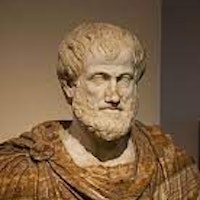As Sight Is
Topic: Truth, Law, & Principle
As sight is in the body, so is reason in the soul.
Aristotle (born 384 BCE in Stagira, a city in northern Greece – died 322 BCE in Chalcis, on the island of Euboea) stands as one of the foundational figures in Western philosophy and science. Born into a family connected to medicine—his father served as court physician to the Macedonian king Amyntas III—Aristotle was immersed from an early age in observation and inquiry into the natural world. At seventeen, he traveled to Athens to study at Plato’s Academy, where he remained for nearly twenty years. While he deeply respected his teacher, Aristotle charted his own course, seeking a more empirical and systematic approach to understanding reality.
His early works reflect both his gratitude for Plato’s vision and his conviction that knowledge must begin with experience.
After Plato’s death, Aristotle spent several years traveling, studying, and teaching. Around 343 BCE, he was invited by King Philip II of Macedon to tutor his son, the future Alexander the Great. When he later returned to Athens, Aristotle founded the Lyceum—also known as the Peripatetic School—a community devoted to research, teaching, and debate. There, he and his students examined every aspect of life, from logic, ethics, and politics to biology, rhetoric, and metaphysics. He classified knowledge into distinct disciplines and developed methods of reasoning that shaped scientific inquiry for millennia. His ethical writings, especially the Nicomachean Ethics, centered on the pursuit of eudaimonia: flourishing through virtue and the balanced cultivation of character.
Aristotle’s influence on philosophy, science, and education has endured for over two thousand years. His thought formed the backbone of medieval scholasticism and continues to inspire dialogue between reason, ethics, and the natural world. He saw human beings as rational and social creatures whose fulfillment lies in living thoughtfully and justly within community. For Aristotle, wisdom was not abstract speculation but a disciplined search for truth grounded in observation, dialogue, and the practice of virtue. His life and writings remain a testament to the enduring human desire to understand the world and one’s place within it.
Nicomachean Ethics
Wilson, Andrew, editor. World Scripture II. Universal Peace Federation, 2011,p. 326 [Aristotle, Nichomachean Ethics 1.6].

Aristotle
Theme: The Light of Truth


About This Aristotle Quotation In Nichomachean Ethics [Commentary]
Aristotle’s comparison, “As sight is in the body, so is reason in the soul,” highlights the essential role of reason in understanding and navigating life. Just as sight allows the body to move safely in its environment, reason guides the soul through moral and intellectual challenges. This analogy sheds light on how critical reasoning is for making ethical decisions and pursuing a fulfilling life. By equating reason with sight, Aristotle emphasizes its importance in discerning truth, guiding our actions towards what is good and virtuous, and achieving human flourishing.
The context passage deepens our understanding by linking knowledge, particularly divine wisdom, to enlightenment. It suggests that reason, much like a light, guides the soul towards truth and virtue, while the knowledge of divine truths clears the path from ignorance to wisdom. This connection between rational and spiritual enlightenment reflects Aristotle’s view that reason enhances the human experience, aligning intellectual pursuit with spiritual growth. It portrays the pursuit of knowledge as a journey from darkness to light, offering direction and clarity.
Reflecting on “The Light of Truth,” Aristotle’s analogy between sight and reason illustrates the enlightening effect of knowledge and wisdom. This view encourages an appreciation for reason’s role beyond practical decision-making, highlighting its significance in moral and spiritual development. The comparison invites us to see enlightenment as a combination of reason and truth-seeking, guiding us towards a life of virtue and fulfillment. Aristotle’s philosophy thus encourages a pursuit of wisdom, guided by reason and the pursuit of truth.
About This Aristotle Quotation In Nichomachean Ethics [Additional Commentary]
Aristotle’s “Nichomachean Ethics,” a foundational text in Western philosophy, explores the concept of virtue and the good life. The quote “As sight is in the body, so is reason in the soul” from Book 1, Chapter 6, succinctly captures Aristotle’s view on the human capacity for reason and its role in achieving a virtuous and fulfilling life. Aristotle likens reason to sight, suggesting that just as sight is essential for the body to navigate and understand the physical world, reason is crucial for the soul to discern and choose the right actions. This analogy underscores the centrality of reason in ethical decision-making and personal development. Aristotle posits that living according to reason is what allows individuals to attain eudaimonia, or flourishing, which he identifies as the highest good for humans. This perspective invites reflection on the importance of cultivating our intellectual faculties, not merely for practical purposes but as a fundamental aspect of achieving a good and meaningful life.
The Light of True Knowledge
Related Quotes
Copyright © 2017 – 2026 LuminaryQuotes.com About Us